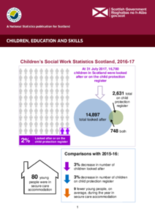Displaying 1281 - 1290 of 2221
This report from the Scottish government presents the latest data on children and young people looked after, on the child protection register and in secure care.
Drawing on qualitative data collected from 15 foster siblings and 14 foster parents, this paper presents birth children's experiences with the beginning of foster care, their perceptions of the positive and negative aspects of living with a foster child, and their suggestions for foster parents, foster children, and professionals.
This study used data from a large representative sample of child welfare investigations to answer the following research questions: 1) Do children with maltreatment histories and academic difficulties differ from those with maltreatment histories but no academic difficulties; and 2) Does the presence of academic difficulties influence ongoing child welfare services.
The aim of this article is to study child welfare workers' individual and collective experiences of and expectations about their occupational role and responsibilities in their administrative and relational work with children and youth in foster care.
This exploratory study aimed to further the understanding of voluntary foster care placements, a topic on which there has been very little research and attention.
In this study, the researchers critically explore the narratives of six youth with ethnic minority backgrounds who had experienced out-of-home placements in Norway.
This study assesses psychological well-being, risk, and resilience of youth currently in-care and former foster youth and how preparation for independent living affects these factors.
This study examines a program (iHeLP) for substance use reduction in foster youth aging out of care.
This study explored stakeholder perceptions of barriers and facilitators to conversations about sexual health between foster/kinship caregivers and youth in foster care, with the goal of developing a brief, scalable sexual health training for caregivers.
This presentation describes the progress of the "Children and Young People in Out-of-Home Care Innovation Fund Integrated Care " project currently being undertaken by Children's Health Queensland.

